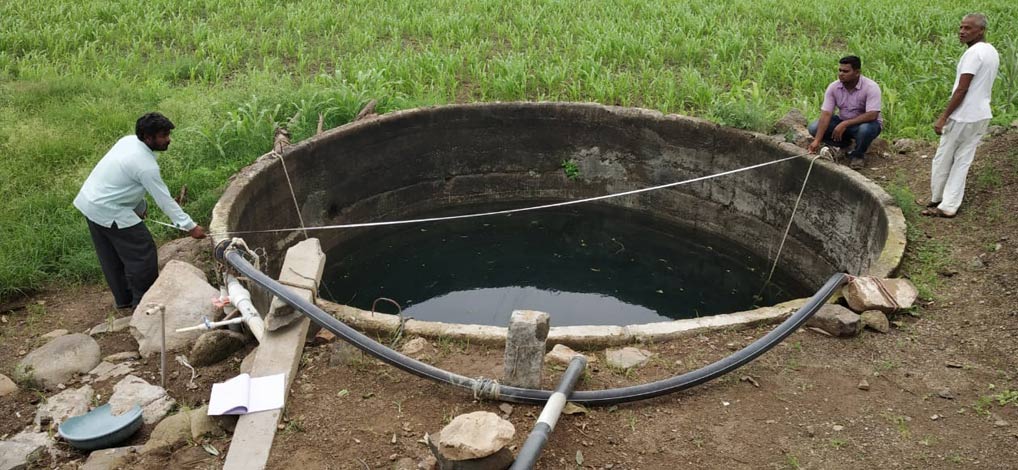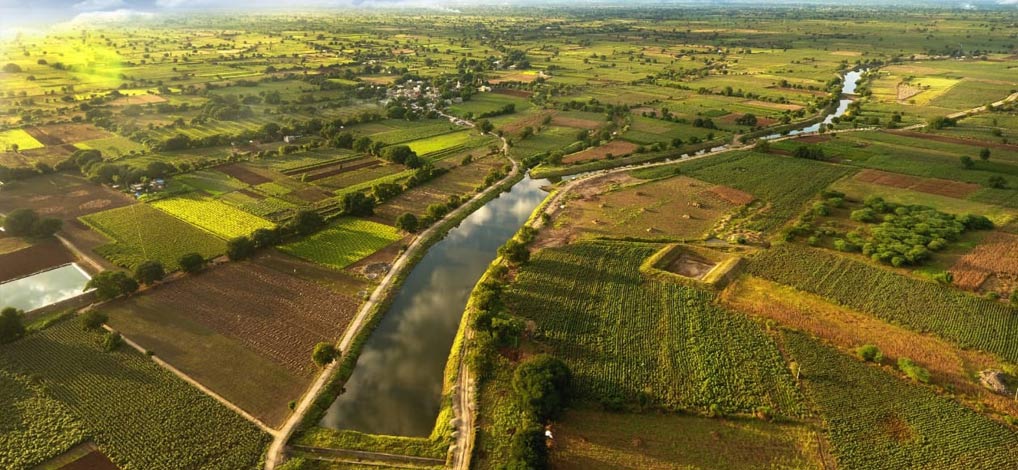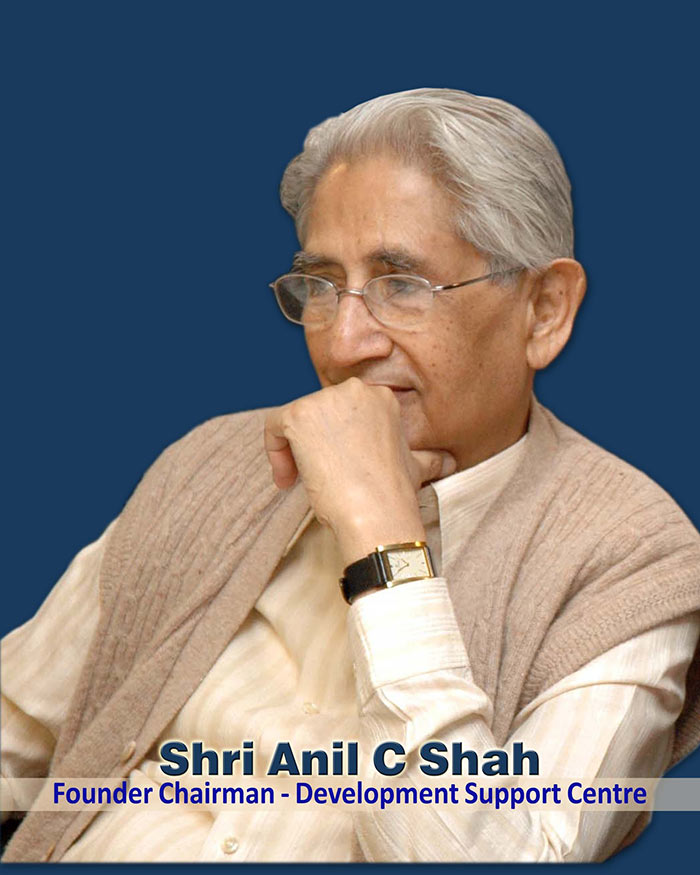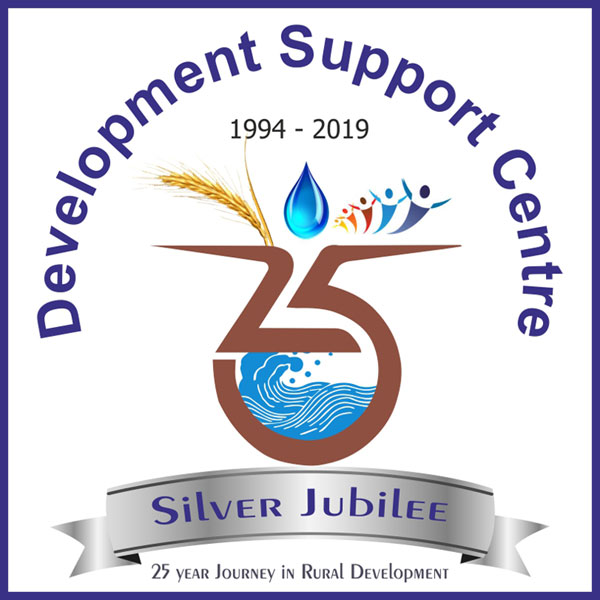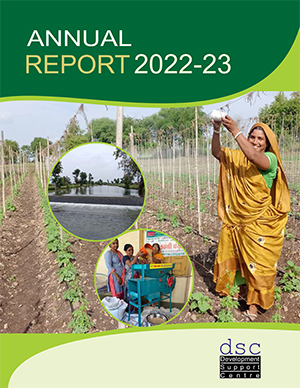Water for Drinking and Domestic use
Home  Water for Drinking and Domestic use
Water for Drinking and Domestic use
DSC's strategy for ensuring drinking water security in watershed villages.
DSC will be adopting a multi-pronged strategy for ensuring drinking water security in the state. As has been the philosophy of the organization, DSC will itself implement the programme in about 30 villages in Dhari, one of the most difficult areas in Saurashtra. It is expected that this implementation will provide valuable learning for the organization both in terms of how to deal with villagers as well as the government. This experience will be useful for conducting capacity building programmes on these issues.
DSC will develop 5-6 villages as models when there is active participation of women in the Pani Samitis. Thus like PIM and watershed, DSC will be effectively using this model for promoting quality pani samitis. It is also envisaged that a group of concerned pani samitis, members would form a forum to deal with post project issues and also help the other villages in the block to deal with issues related to drinking water. This forum would be a network at the block level and would continuously interact with villagers, NGOs and Government to provide feedback on issues concerning drinking water.
At the secondary level, DSC has already conducted three district level workshops on these issues wherein it has tried to coordinate and bring together WASMO and DRDA. In many cases, it was found that through these workshops the DRDA and WASMO have come together for the first time. The outcomes of the workshops have also been quite encouraging as the Panchayati Raj functionaries and DDO as well as DRDA and WASMO have spelt out issues and constraints in promoting drinking water security. However it is found that having a district workshop does not suffice. Considerable work will have to be done at the taluka level and similar workshops will have to be conducted to ensure that the functionaries have a proper understanding of this issue. Assuming that there are about 10 talukas in each district. DSC could conduct about three workshops at the taluka level wherein the other talukas will also participate. Thereafter each taluka would identify 3-5 watershed villages wherein such work has to be carried out along with the PIA (NGO or PR). At present DSC plans to cover six districts viz. Rajkot, Bhavnagar, Amreli, Sabarkantha, Jamnagadh and Bharuch. Assuming three villages per block i.e. 30 villages per district, DSC would try and ensure that at least 180 watershed villages having a drinking water security i.e. where there are effective pani samitis and the local water source has been developed together by DRDA and WASMO. Based on this experience, DSC would then conduct a state level workshop wherein WASMO, PIA functionaries, NGOs as well as pani samitis could present their best practices and identify enabling policy mechanisms that could be later on followed up with the Water Supply Board as well as Commissionerate Rural Development. This experience of six districts could thereafter be spread to other 19 districts. It is expected that this would take about 2-3 years.
CHALLENGES:
Dhari:
As indicated earlier, working in Dhari has never been easy - largely because the community is caste-ridden , there is high political involvement and therefore most of the villages are divided because of strong affiliations with the two major political parties. Thus if one party stands to be in power in the village panchayat, the other party and people associated with the same are bound to oppose it and make sure that nay development scheme does not reach the village. Besides the status of women is quite low and they are hardly allow to participate in any public forum. In such a situation it will be very challenging to ensure that the right kind of people and women are participating actively in pani samitis. Dhari also has a dubious distinction of having large number of defaulters as well as false claims for insurance and therefore ensuring genuine contribution is another major challenge for the organization.
Other Districts:
While a positive response has been so far received largely at the district level - one of the major challenges would be to translate this into action at the village level. It will require intensive efforts from the organization as well as a positive response form the Government, PRI and WASMO functionaries. It is quite a daunting task and therefore it will not be easy to receive positive responses from all the districts.
At present there is a 2-member team looking at the drinking water issues from the central office. However looking at the nature of work we may need another person with effective coordination skills to be responsible for specific districts as well as the talukas within. Only if continuous and vigorous follow up is done one can ensure that the model villages proposed in each block will take place.
The present Secretary of Water Supply Board and Project Director of WASMO both are quite positive and the keen to learn from different experiences of promoting drinking water security in watershed villages. In fact the Project Director Shri RK Sama, WASMO has been a source of inspiration and has been a resource person in all the district level workshops held so far. However to translate this experience, at the state level, is another challenge as this will depend on how the district administration reacts to this.
DSC Experience on DRINKING WATER Implementation (Dhari)
In the starting of 2007-08, DSC had a plan to initiate the WASMO assisted drinking water security programme only in three villages on pilot basis. But looking to DSC`s technical capacities, rapport and strong presence in the local area, the WASMO offered to allocate 30 villages to DSC. Keeping in view the need, in October 2007, DSC scaled up the project in total 30 villages. District Water and Sanitation Committee (DWSC), Amreli district, sanctioned 30 projects Drinking water security under Sector Reform Scheme (State) or Swajaldhara to Development Support Center Dhari-Amreli. The programme cycle for each village will be eighteen months on the 1st October 2007 MERGEFIELD ISA_Agreement_Status_done_during_the_pe and shall terminate without notice on 31st March 2009.
The project has two components including developing water source and distribution network component for creating drinking water in the village and capacity building and awareness of the community for promoting , hygiene, and environmental sanitation services on behalf of the Programme. A team of 6 professionals including Diploma Civil Engineers and Community Organizers recruited and deployed in the field for facilitating the project activities. As per the plan DSC has taken following sequential steps for the project implementation including community mobilizing, capacity building , and technical survey and technical sanctions;
The Pani Samitis have been formed in all the 30 villages. Out of which, DSC team, villagers and the WASMO professionals conducted joint survey for preparing plan and estimate of physical works and water pipe line in 21 villages. WASMO released Rs. 58.91 lakhs for the construction works in 18 villages. The works against the allocated grant have been almost completed including well/ tube well, laying pipe lines, construction of overhead tank, washing ghats, stamp post etc. WASMO have given technical sanctions for carry out works of Rs. 2.61 crores. DSC has already collected and deposited required matching community contribution of Rs. 13.77 lakhs from the community. The contribution has been deposited to the Bank account of the Pani Samitis. DSC has organized 22 major capacity building programme benefiting 600 participant including programmes like technical, financial and administrative training to Pani Samitis, training on chlorination and exposure to successful projects.









